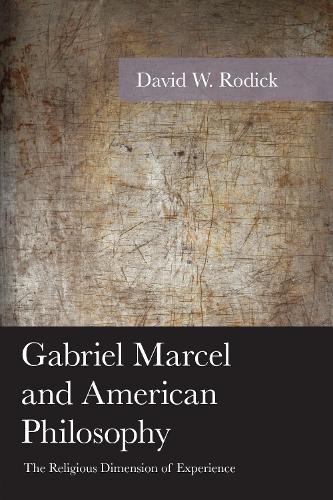
Gabriel Marcel and American Philosophy: The Religious Dimension of Experience
(Hardback)
Publishing Details
Gabriel Marcel and American Philosophy: The Religious Dimension of Experience
By (Author) David W. Rodick
Bloomsbury Publishing PLC
Lexington Books
12th April 2017
United States
Classifications
Professional and Scholarly
Non Fiction
Philosophy
194
Physical Properties
Hardback
152
Width 160mm, Height 237mm, Spine 16mm
372g
Description
Gabriel Marcel and American Philosophy: The Religious Dimension of Experience examines the philosophy of Gabriel Marcel and its relationship to key figures in classical American Philosophy, in particular Josiah Royce, William Ernest Hocking, and Henry Bugbee. Few scholars have taken sufficient note of the fact that Gabriel Marcels thought is vitally informed by classical American philosophy. Marcels essays on Royce offer a window into the soul of Marcels recent philosophical development. The idealism of early Marcel stemmed from an omnipresent sense of a broken worldan experience of rent or tear within the tissue of experience similar to what John Dewey referred to as an inward laceration of the spirit. Furthermore, Marcels intuition concerning the primacy of intersubjective experience can help us understand W. E. Hockings thought. Finally, Marcels notion of exigence ontologique clarifies his relationship to Henry Bugbee. Marcel and Bugbee explore the contour of experiencethe indigenous circuit of associations pertaining to the self as coesse. Through a reflexive act Marcel refers to as ingatherdness, the self undergoes increasing degrees of unification by experiencing an act of faith made explicit only in a dialectical act of participation. David W. Rodick shows that Marcels relationship to these American philosophers is not coincidental, but rather the philosophical expression of his Christian faith. Marcels most important legacy is his commitment to unity of Christian philosophizing, a unity derived from both reason and revelation. Its diversity stems from the objective plurality of what is pursued as well as the subjective plurality of those who pursue it. Christian philosophizing seeks a truth that every Christian believes can never be untrue to itself.
Reviews
David Rodicks fascinating study tracks the French philosopher Gabriel Marcel's conversations with the AmericansHenry Bugbee, W. E. Hocking, Josiah Royce, and William James. It's a pleasure to getin step as Marcel pursues the religious and spiritual veins of everyday experiences of others, art, and nature, accompanied by these Americans. We trace their subtle explorations of what Marcel calls the mystery of being. -- Edward F. Mooney, Syracuse University
An important thinker in twentieth century thought, Gabriel Marcels affinity for, and debt to, American philosophy is well known, especially the work of Josiah Royce, William James, William Ernest Hocking and Henry Bugby. Yet David Rodicks book is the first extensive study of Marcels interaction with these distinguished American thinkers. It provides a fascinating introduction to the central themes of radical empiricism, intersubjectivity and transcendence, and also illuminates the continuing relevance of Marcels ideas for our times. The book is a first rate addition to the literature on Marcel. -- Brendan Sweetman, Rockhurst University
The influence of idealism on Marcels early philosophy is often noted, but Rodick tells a more complex story. His essays explore historical and philosophical intersections between the thought of Gabriel Marcel and the work of American philosophers Josiah Royce, William Ernest Hocking and Henry Bugbee. Rodick demonstrates their interactions with Marcel, illuminates central insights of all these philosophers, and achieves particular depth in his analyses of intersubjectivity, praxis, and religious experience. I recommend this book to anyone interested in American philosophy, idealism, Marcel, and/or existential, exploratory thinking. -- Teresa I. Reed, Quincy University
Author Bio
David W. Rodick is associate professor at Xavier University.
